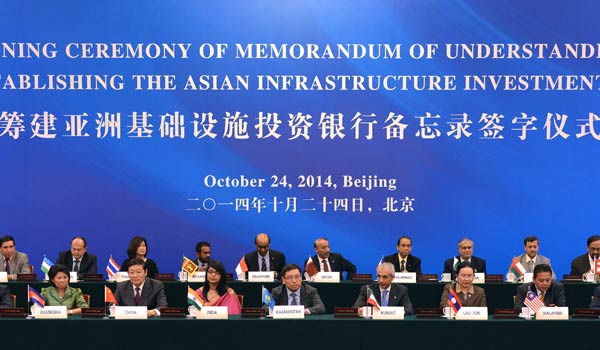

 |
| The signing ceremony of memorandum of understanding on establishing the Asian Infrastructure Investment Bank (AIIB) is held in Beijing, Oct 24 2014. [Photo/Xinhua] |
Forty-four countries including some major economies had applied to become founding members of the China-led Asian Infrastructure Investment Bank (AIIB) when the deadline closed on Mar.31, 2015. Oddly enough, the United States maintianed its refusal to join the AIIB.
The Obama administration's tone towards the AIIB shows that the U.S. is still not ready to handle its relations with China rationally, for all that China is now the second largest economy in the world. The Transatlantic Trade and Investment Partnership (TTIP) and the Trans-Pacific Partnership (TTP) are among the priorities of the Obama administration.
The TTIP is a proposed trade agreement between the European Union and the United States. The TTIP will ensure free trade between the two largest world economies - which together account for one third of world trade in goods and half of world GDP. The TTIP will also reduce trade and investment disputes between the United States and its allied developed nations and make it possible for western nations to exercise even greater clout in the global economic system. The emerging nations may be forced to adopt the same, high standards regulated in the TTIP.
In its proposals such as the "Belt and Road" initiatives, the Silk Road fund, and the AIIB, China's focus is on improving infrastructure and enhancing inter-connectivity and inter-communication. China's goal is to establish an extended economic community of shared destiny while enhancing relations with neighbors. These initiatives increase the inter-connectivity between Asia, Europe and Latin America and challenge the dominance of the international political and economic order centered on oil and the U.S. dollar.
China's diplomatic strategy mirrors its growing economic clout. The Obama administration wishes to offset the impact of China's rise by various means such as increasing China's voting share in the International Monetary Fund, the World Bank and other international institutions, but these ideas can hardly get approval from U.S. Congress becuase they would weaken U.S.dominance in economy.
It seems that the Obama administration has no option but to persuade its allies not to join the AIIB, if the U.S. wants to diminish China's growing economic influence. In this, the Obama Administration has made a foreign policy blunder in the face of overwhelming support for the AIIB from U.S. allies.
The US Treasury Secretary Jack Lew completed his visit to China several days ago. China wants the U.S. to see the AIIB as a complimentary organization to the Asian Development Bank and other international institutions, and ponder on the mutual benefits brought by win-win cooperation.
 J-11 fighters in air exercise
J-11 fighters in air exercise Beauties dancing on the rings
Beauties dancing on the rings Attendants-to-be join Mr. & Miss Campus Contest
Attendants-to-be join Mr. & Miss Campus Contest Beijing's toughest anti-smoking law takes effect
Beijing's toughest anti-smoking law takes effect Family lives in cave for about 50 years in SW China
Family lives in cave for about 50 years in SW China PLA soldiers operating vehicle-mounted guns in drill
PLA soldiers operating vehicle-mounted guns in drill Blind carpenter in E China's Jiangxi
Blind carpenter in E China's Jiangxi China hosts overseas disaster relief exercise for the first time
China hosts overseas disaster relief exercise for the first time 20 pairs of twins who will become flight attendants in Sichuan
20 pairs of twins who will become flight attendants in Sichuan Obama is sowing discontent in S.China Sea
Obama is sowing discontent in S.China Sea Rescuers work through night to reach cruise ship survivors
Rescuers work through night to reach cruise ship survivors Driving through limbo
Driving through limbo Facing down MERS
Facing down MERSDay|Week